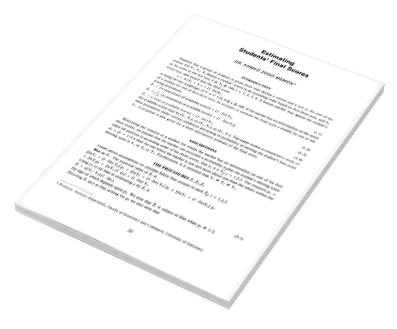Estimating Students' Final Scores
DOI:
https://doi.org/10.37376/deb.v17i2.1935الملخص
INTRODUCTION Suppose that a group of students is given three tests during a course and a test at the end of the course. Let Yı, Y2, Yz denote a student' scores in an ascending order based on first three tests, and Y4 as his score in the last test; 0 SY; = 100, i = 1, 2, 3, 4. A lenient teacher may ignore the student's worst test, and award him the final score y = w (Y2 + Y3) + (1 -2w)Y4, (1.1) w being the test-weightage, 0 <w< 1/2,0 Sy < 100. If the teacher has no information on the result of a student for one of first three tests, he attempts to estimate the final score y usually by one of fol lowing procedures. Ĉi = 2w (maximum of available scores) + (1 - 2w) Y4, (1.2) 22 = 1 [w(maximum of available scores) + (1 - 2w) Y4],
(1.3) Î3 = w (sum of available scores) + (1 - 2w) Y4, (1.4) the available scores may be (Y1, Y2), or (Y2, Yz), or (Y), Y3). This paper makes a comparative study of these procedures under various conditions pertaining to probability of missing the student's best score Y3. A proposal is also given for a more satisfactory estimate of the final score.
التنزيلات

التنزيلات
منشور
كيفية الاقتباس
إصدار
القسم
الرخصة
الحقوق الفكرية (c) 2022 دراسات في الاقتصاد والتجارة

هذا العمل مرخص بموجب Creative Commons Attribution-NonCommercial-NoDerivatives 4.0 International License.







